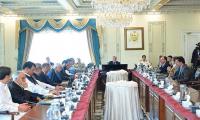TEHRAN: Iran’s Foreign Minister Mohammed Javad Zarif said on Monday the "genocidal taunts" of US President Donald Trump will not "end Iran", amid a spike in tensions between the two countries.
"Iranians have stood tall for millennia while aggressors all gone. Economic terrorism and genocidal taunts won’t ‘end Iran’," Zarif wrote on Twitter.
"Never threaten an Iranian. Try respect -- it works!" he added. The comments by Iran’s top diplomat follow an ominous warning by Trump, who on Sunday suggested the Islamic republic would be destroyed if it attacked US interests.
"If Iran wants to fight, that will be the official end of Iran. Never threaten the United States again," Trump tweeted. Relations between Washington and Tehran plummeted a year ago when Trump pulled out of a landmark 2015 nuclear deal with Iran and imposed tough sanctions.
Tensions have risen further this month with Washington announcing further economic measures against Tehran, before deploying a carrier group and B-52 bombers to the Gulf over unspecified Iranian "threats". The claim has been met with widespread scepticism outside the United States.
The Trump administration last week ordered non-essential diplomatic staff out of Iraq, citing threats from Iranian-backed Iraqi armed groups. On Sunday a rocket was fired into the Green Zone of the Iraqi capital Baghdad, which houses government offices and embassies including the US mission. It was not immediately clear who was behind the attack.
Meanwhile, president Donald Trump earlier, issued an ominous warning to Iran on Sunday, suggesting that if the Islamic republic attacks American interests, it will be destroyed. "If Iran wants to fight, that will be the official end of Iran. Never threaten the United States again," Trump said in a tweet.
Tensions between Washington and Tehran have been on the rise as the United States has deployed a carrier group and B-52 bombers to the Gulf over what it termed Iranian "threats." This account has been met with widespread skepticism outside the United States.
The White House has sent mixed signals in recent days, amid multiple US media reports of infighting in Trump’s cabinet over how hard to push Washington’s arch foe Iran.
The Trump administration has ordered non-essential diplomatic staff out of Iraq, citing threats from Iranian-backed Iraqi armed groups, and sent an aircraft carrier and heavy B-52 bombers to the region.
According to US media reports, Trump’s long-hawkish national security adviser John Bolton is pushing a hard line on Iran, but others in the administration are resisting. Trump himself said recently that he has to "temper" Bolton.
Iran’s foreign minister downplayed the prospect of a new war in the region on Saturday, saying Tehran opposed it and no party was under the "illusion" the Islamic republic could be confronted.
"We are certain... there will not be a war since neither we want a war nor does anyone have the illusion they can confront Iran in the region," Mohammed Javad Zarif told state-run news agency IRNA at the end of a visit to China.
Iran-US relations hit a new low last year as US Trump pulled out of a 2015 nuclear deal and reimposed unilateral sanctions that had been lifted in exchange for Tehran scaling back its nuclear programme.
Saudi Arabia called on Sunday for emergency regional talks to discuss the mounting Gulf tensions, saying that it does not want war with Iran but is ready to defend itself.
It comes days after mysterious sabotage attacks on several tankers in highly sensitive Gulf waters and drone strikes on a Saudi crude pipeline by Yemen rebels who Riyadh claimed were acting on Iranian orders.
King Salman invited Gulf leaders and Arab League member states to two emergency summits in Makkah on May 30 to discuss recent "aggressions and their consequences", the kingdom’s official SPA news agency reported late on Saturday. Saudi Arabia’s minister of state for foreign affairs, Adel al-Jubeir, said on Sunday his country does not want to go to war with Iran but would defend itself.
Harvey Weinstein. — AFP FileNEW YORK: Harvey Weinstein’s 2020 conviction for sexual assault and rape was...
Liberal Justice Elena Kagan on Sept. 13, 2016. — Slate website WASHINGTON: U.S. Supreme Court justices, wading back...
A representational image of inmates behind jail bars. — Unsplash/FileMOSCOW: A Russian court on Wednesday ordered...
Sudanese soldiers guard the surrounding area of the UNMIS compound in El-Fasher, the administrative capital of North...
US quietly shipped ATACMS missiles to Ukraine. — Report news agencyWASHINGTON: The United States in recent weeks...
US President Joe Biden during his address in California. — AFP FileWASHINGTON: President Joe Biden signed a...







